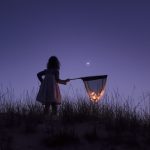
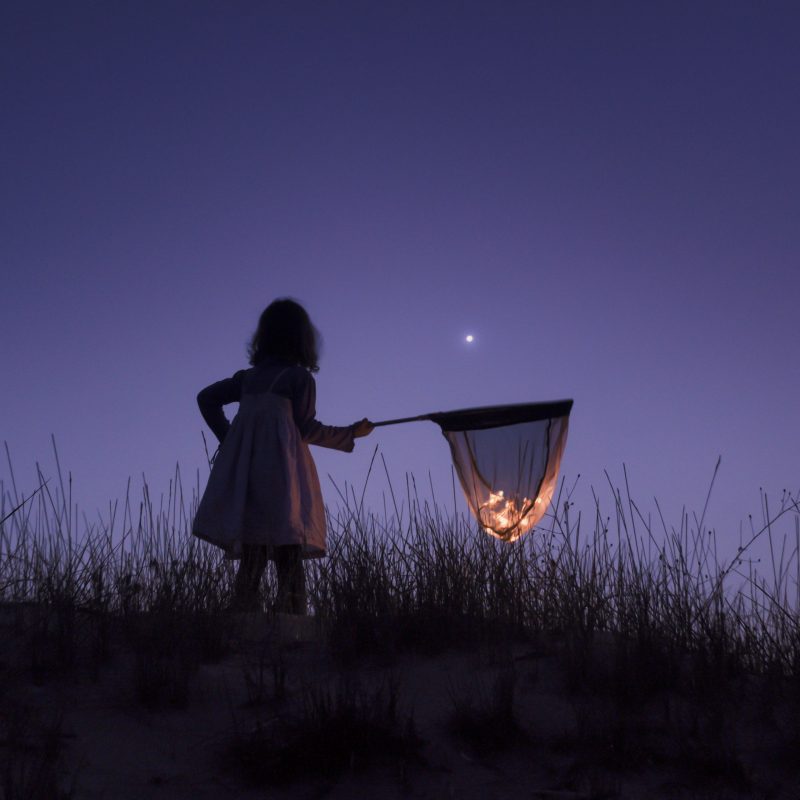
View larger | Mihail Minkov captured this photo, which is titled Star Catcher. The photo is from the Black Sea Coast of Bulgaria. It’s the 1st-place winner in 2020’s IDA photo contest, in the Connecting to the Dark category.
The International Dark-Sky Association (IDA) held its first annual Capture the Dark photography competition during May 2020. The goal was to portray the meaning of the night for people around the world. Participants were invited to submit images in five categories: Connecting to the Dark, International Dark Sky Places, Impact of Light Pollution, Bright Side of Lighting, and Youth. In two weeks, IDA received nearly 450 submissions from people around the world. An international panel of judges made the final selections. The winning entries in each category are on this page.
See all winners’ and finalists’ photos here.
Category 1: Connecting to the Dark.
IDA explained:
Experiencing a natural night provides perspective, inspiration, and leads us to reflect on our humanity and place in the universe.
The winning entry in this category is Star Catcher, shown at the top of this post. Photographer Mihail Minkov said:
I have a 4-year-old daughter, who is really in love with the night sky … She is always asking to come with me when I go to shoot the Milky Way. So I decided to make her part of the process and try to show her what it’s like to be out under the dark sky, and see the beauty of the night sky. I hope that one day, she will remember that, and this memory will make her a good and decent person, who really takes care of the planet and the night sky.
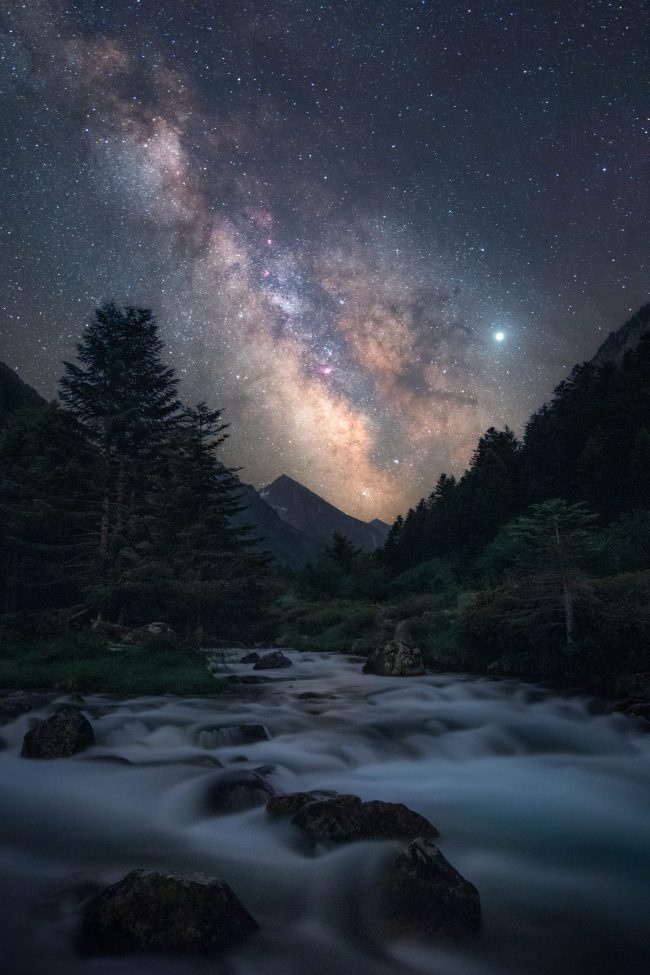
View larger. | Jean-Francois Graffand captured this image at the Pic du Midi International Dark Sky Reserve in France. It’s the winner in the International Dark Sky Places category. The photo is titled Dark Night in Pyrénées Mountains.
Category 2: International Dark Sky Places.
IDA explained:
Over 130 protected lands and municipalities have been certified by IDA as an International Dark Sky Place creating havens for astrophotographers around the world.
Winning photographer Jean-Francois Graffand said:
A typical landscape of French Pyrénées mountains, taken inside the Pic du Midi Dark Sky Reserve, during a summer night. At 1,400-meters [4,600 feet] of altitude, the mountain torrent descends into the valley where absolutely no source of light is visible at night.
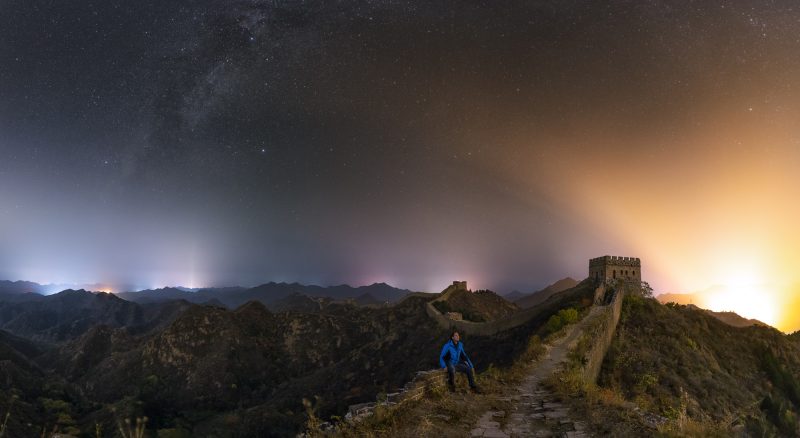
View larger. | Petr Horálek captured this image at the Great Wall of China. It’s the winner in the Impact of Light Pollution category. The photo is titled Remembering the Old Times.
Category 3: Impact of Light Pollution.
IDA explained:
Light pollution can have significant impacts on the environment, human health, and our access to the universe.
Winning photographer Petr Horálek said:
Stargazing on one of the most legendary ancient human creations, the Chinese Great Wall, makes you deeply think. A piece of deepest history meets current civilization, unfortunately producing the light pollution. Think about how wonderful skies looked for ancient Chinese people walking the wall.
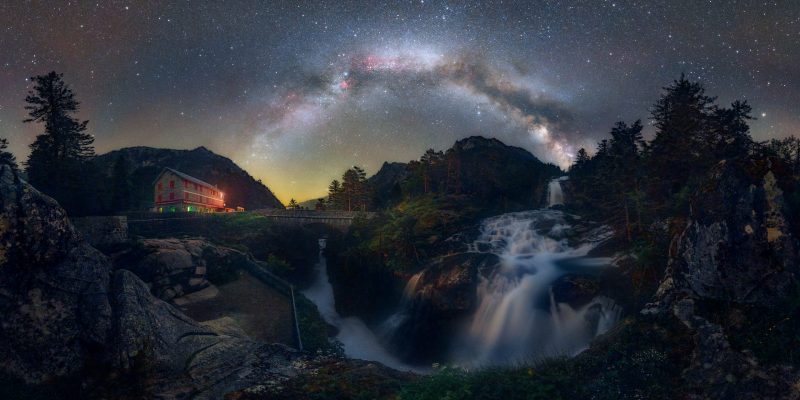
View larger. | Jean-Francois Graffand captured this photo at the Pyrénées National Parc in France. It’s the winner in the Bright Side of Lighting category. It’s titled The Celestial River.
Category 4: Bright Side of Lighting.
IDA explained:
Light pollution can give lighting a bad rap. But lighting that follows IDA’s Principles for Responsible Outdoor Light can be beautiful, healthy, and functional.
Winning photographer Jean-Francois Graffand said:
Panoramic view of the Pont d’Espagne site, in the heart of the Pic du Midi Dark Sky Reserve … Surrounded by the mountains at 1500m [5,000 ft] of altitude, all the city lights in the valley are hidden. During the summer tourist season, the little restaurant hosts some employees, which can generate the only light source. Here only a faint warm bedside lamp is turned on in a room, but amplified by the long exposure and high iso, it seems to light up the place like a beacon and reveals the landscape.
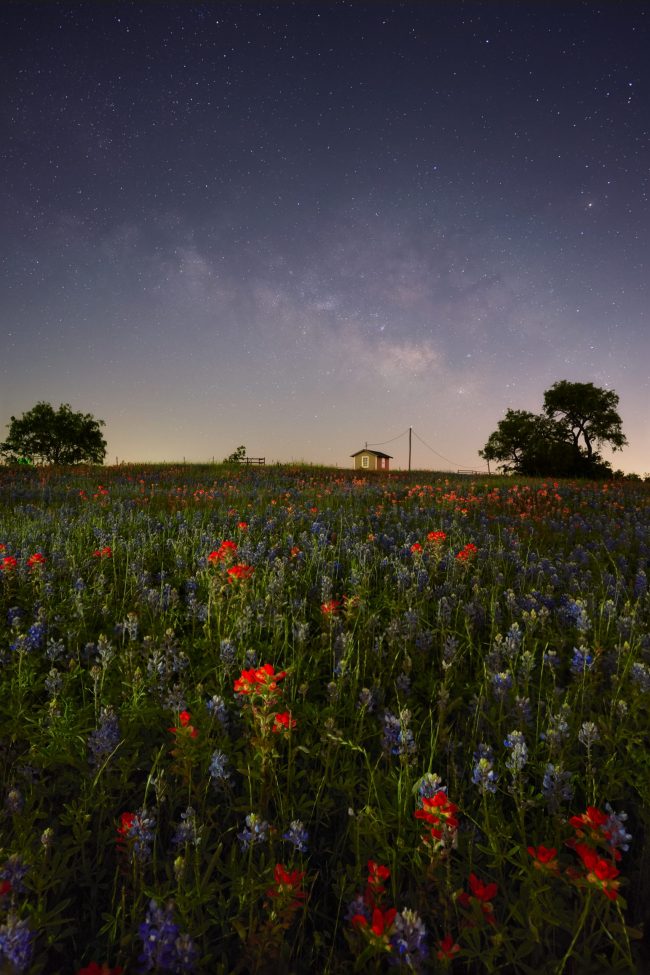
View larger.| Nayana Rajesh, age 16, captured the winning entry in the Youth category. The photo is set in Ennis, Texas. It’s titled “The Barn.”
Category 5: Youth.
IDA explained:
Entrant must be 17 years old or younger.
Winning photographer Nayana Rajesh said:
One of my favorite things about living in Texas is the blooming of the bluebonnets each year. I went out to Ennis, Texas, to shoot the bluebonnets under the stars at a ranch owned by our friend Jim. It’s important to me to always be learning something new every time I shoot, so I spent the night learning how to focus stack manually and think through different compositions.
See all winners’ and finalists’ photos here.

Bottom line: Winning photos in the International Dark-Sky Association (IDA) 2020 photography contest.
Via International Dark-Sky Association
See all winners’ and finalists’ photos here.
from EarthSky https://ift.tt/2ZsjySA


View larger | Mihail Minkov captured this photo, which is titled Star Catcher. The photo is from the Black Sea Coast of Bulgaria. It’s the 1st-place winner in 2020’s IDA photo contest, in the Connecting to the Dark category.
The International Dark-Sky Association (IDA) held its first annual Capture the Dark photography competition during May 2020. The goal was to portray the meaning of the night for people around the world. Participants were invited to submit images in five categories: Connecting to the Dark, International Dark Sky Places, Impact of Light Pollution, Bright Side of Lighting, and Youth. In two weeks, IDA received nearly 450 submissions from people around the world. An international panel of judges made the final selections. The winning entries in each category are on this page.
See all winners’ and finalists’ photos here.
Category 1: Connecting to the Dark.
IDA explained:
Experiencing a natural night provides perspective, inspiration, and leads us to reflect on our humanity and place in the universe.
The winning entry in this category is Star Catcher, shown at the top of this post. Photographer Mihail Minkov said:
I have a 4-year-old daughter, who is really in love with the night sky … She is always asking to come with me when I go to shoot the Milky Way. So I decided to make her part of the process and try to show her what it’s like to be out under the dark sky, and see the beauty of the night sky. I hope that one day, she will remember that, and this memory will make her a good and decent person, who really takes care of the planet and the night sky.

View larger. | Jean-Francois Graffand captured this image at the Pic du Midi International Dark Sky Reserve in France. It’s the winner in the International Dark Sky Places category. The photo is titled Dark Night in Pyrénées Mountains.
Category 2: International Dark Sky Places.
IDA explained:
Over 130 protected lands and municipalities have been certified by IDA as an International Dark Sky Place creating havens for astrophotographers around the world.
Winning photographer Jean-Francois Graffand said:
A typical landscape of French Pyrénées mountains, taken inside the Pic du Midi Dark Sky Reserve, during a summer night. At 1,400-meters [4,600 feet] of altitude, the mountain torrent descends into the valley where absolutely no source of light is visible at night.

View larger. | Petr Horálek captured this image at the Great Wall of China. It’s the winner in the Impact of Light Pollution category. The photo is titled Remembering the Old Times.
Category 3: Impact of Light Pollution.
IDA explained:
Light pollution can have significant impacts on the environment, human health, and our access to the universe.
Winning photographer Petr Horálek said:
Stargazing on one of the most legendary ancient human creations, the Chinese Great Wall, makes you deeply think. A piece of deepest history meets current civilization, unfortunately producing the light pollution. Think about how wonderful skies looked for ancient Chinese people walking the wall.

View larger. | Jean-Francois Graffand captured this photo at the Pyrénées National Parc in France. It’s the winner in the Bright Side of Lighting category. It’s titled The Celestial River.
Category 4: Bright Side of Lighting.
IDA explained:
Light pollution can give lighting a bad rap. But lighting that follows IDA’s Principles for Responsible Outdoor Light can be beautiful, healthy, and functional.
Winning photographer Jean-Francois Graffand said:
Panoramic view of the Pont d’Espagne site, in the heart of the Pic du Midi Dark Sky Reserve … Surrounded by the mountains at 1500m [5,000 ft] of altitude, all the city lights in the valley are hidden. During the summer tourist season, the little restaurant hosts some employees, which can generate the only light source. Here only a faint warm bedside lamp is turned on in a room, but amplified by the long exposure and high iso, it seems to light up the place like a beacon and reveals the landscape.

View larger.| Nayana Rajesh, age 16, captured the winning entry in the Youth category. The photo is set in Ennis, Texas. It’s titled “The Barn.”
Category 5: Youth.
IDA explained:
Entrant must be 17 years old or younger.
Winning photographer Nayana Rajesh said:
One of my favorite things about living in Texas is the blooming of the bluebonnets each year. I went out to Ennis, Texas, to shoot the bluebonnets under the stars at a ranch owned by our friend Jim. It’s important to me to always be learning something new every time I shoot, so I spent the night learning how to focus stack manually and think through different compositions.
See all winners’ and finalists’ photos here.

Bottom line: Winning photos in the International Dark-Sky Association (IDA) 2020 photography contest.
Via International Dark-Sky Association
See all winners’ and finalists’ photos here.
from EarthSky https://ift.tt/2ZsjySA

Aucun commentaire:
Enregistrer un commentaire